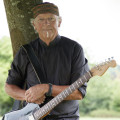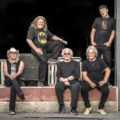Blue Oyster Cult co-founder Albert Bouchard unravels the complexities of “Imaginos II”
 Photo provided by Deko Entertainment
Photo provided by Deko Entertainment
Since his earliest days of transitioning from burgeoning blues and psychedelic rock bands in Upstate New York, to what became the internationally recognized, harder-edged Blue Öyster Cult circa the early 1970s, co-founding drummer, sometimes singer/songwriter and accomplished guitarist Albert Bouchard clung tightly to a series of poems and musings conceived by the group’s producer, manager, contributing lyricist and all-around impresario Sandy Pearlman.
However, long before the complex collection that tied them all together, eventually known as “Imaginos,” finally came to fruition, the guys were busy scaling the charts with the classics “(Don’t Fear) The Reaper,” “Burnin’ For You” and “Godzilla,” plus gaining tremendous traction with “Cites On Flame With Rock And Roll” and “Hot Rails To Hell” (both co-penned and sung by Albert).
Once he accomplished everything imaginable in the collaborative setting, Bouchard finally made a deep solo dive into interpreting “Imaginos,” though after considerable record label red tape held up the proceedings throughout much of the 1980s, it wound up being revised and released under the complete band banner.
So with that, he temporarily went back to Blue Öyster Cult, whose rock opera edition in 1988 boasted the tag line “a bedtime story for the children of the damned,” but the reunion proved short-lived as misunderstandings emerged, musical tides were turning and poor sales led to it quickly falling out of print (with vinyl copies still commanding nearly $100 online).
Yet like many underrated and overlooked albums, the legend of “Imaginos” has steadily grown over the years, especially after it was remastered and reissued as part of “The Columbia Albums Collection” in 2012, followed by Bouchard revisiting the concept with Pearlman shortly before the latter’s unexpected passing in 2016.
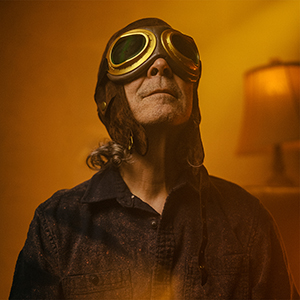 The results led to not only 2020’s more acoustically-minded “Re Imaginos,” along the lines of the original project’s organic intentions, but soon spawned the epic, fully-charged sequel “Imaginos 2 – Bombs Over Germany (Minus Zero And Counting),” described as “a concept album about an alien conspiracy that is brought to fruition during the late 19th and early 20th century through the actions of Imaginos, an agent of evil.”
The results led to not only 2020’s more acoustically-minded “Re Imaginos,” along the lines of the original project’s organic intentions, but soon spawned the epic, fully-charged sequel “Imaginos 2 – Bombs Over Germany (Minus Zero And Counting),” described as “a concept album about an alien conspiracy that is brought to fruition during the late 19th and early 20th century through the actions of Imaginos, an agent of evil.”
The multi-million album-seller rang Chicago Concert Reviews for more on what will ultimately be a trilogy (and graphic novel) in honor of Pearlman’s ambitious vision, getting several of the original and current Blue Öyster Cult members back together for contributions and reflecting on a few collective crests in the midst of their 50th anniversary.
Can you give us the somewhat complex backstory behind “Imaginos”?
Albert Bouchard: Within a couple weeks of meeting Sandy, he came over to the band house and he started telling this story about this character, Imaginos, and how he was a manipulator of history. He had a whole different view of the history of the world with all the world wars, where it was all effected by this Imaginos character, and I thought that was fascinating. I had never met anybody like this who could create this whole fantasy world, dreamscape and alternate universe…At first, he didn’t really write lyrics for the group. It was basically me and [late keyboardist/rhythm guitarist] Allen Lanier who wrote all the songs in the early days. Eventually, Sandy would come and say, “you know, I like that song, but the lyrics could be better.” He would present a whole set of lyrics to Allen or me, depending on who’s song it was, and most of the time it was very interesting. It was kind of like [lyricist] Robert Hunter with the Grateful Dead, where he was writing about things that people don’t usually write about. It’s always about love or sex, basically, for most songs. This was not about that at all. It was about the story. I guess it would fall into the “murder ballad” category, except it was way bigger than that.
Fast forward to Blue Öyster Cult’s had hits, we’re on the road, we’ve been together for about a decade or so and he had said, “I think you should do a whole album of these songs that I’ve written. Put them all together and make it part of the story.” I was really into it. This was around the time after [1979’s] “Mirrors.” When we did “Mirrors,” I was very disappointed with the underwhelming reaction. “It’s just not Blue Öyster Cult. It sounds like you guys are trying to be The Cars or something.” I wasn’t trying to be The Cars. I wrote a song that was parodying The Cars and then one of the guys presented it to the producer, Tom Werman [after our top choice, Keith Olsen, was not available]. “This is great” and I’m like, “no it’s not. This is a joke.” It seemed he didn’t understand where we were coming from and “Mirrors” had no Sandy Pearlman songs whatsoever, even though we presented Sandy’s songs, but he didn’t like them. So the next album, [1980’s] “Cultösaurus Erectus,” we had to get back [on track]. Martin Birch was the producer and we were very excited about that because he produced some of the greatest records up to that point, the Deep Purple records and some of the Fleetwood Mac stuff, pre-Keith Olsen. I don’t think we did any Sandy songs on that, but we sort of returned to our roots.
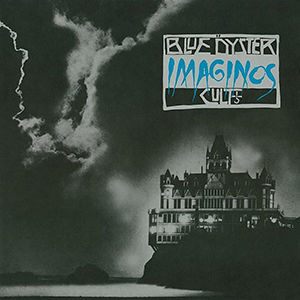 I remember as we were doing it, I was working up these “Imaginos” songs and saying we should make the whole thing “Imaginos” and they were like, “no way. We’re never going to have a hit with that stuff.” And I’m like “so what?” The whole idea of that record was to not make it [a hit]. As a matter of fact, “Burnin’ For You” was suggested. [lead guitarist/vocalist] Donald [“Buck Dharma” Roeser] had done a demo of it and we said “no, it’s too commercial,” so we turned it down for “Cultösaurus Erectus.” Then the album came out and it didn’t sell a whole lot, but the fans and the critics loved it, so we were like “okay, I think we’re getting back on track here. I think it’s time that we can put something commercial on there.” By [1981’s] “Fear Of Unknown Origin,” I’d given up on trying to get them to do “Imaginos” and Sandy had to. He was like “listen, you follow your path and see what happens.” Then we had another hit. We had our biggest hit really. “Burnin’ For You,” contrary to popular belief, was a higher and longer charting record than “(Don’t Fear) The Reaper.” Then at the end of that, I was asked to leave the group and Sandy said, “don’t worry, I’ve been working on getting a solo record deal for you to do what we wanted.”
I remember as we were doing it, I was working up these “Imaginos” songs and saying we should make the whole thing “Imaginos” and they were like, “no way. We’re never going to have a hit with that stuff.” And I’m like “so what?” The whole idea of that record was to not make it [a hit]. As a matter of fact, “Burnin’ For You” was suggested. [lead guitarist/vocalist] Donald [“Buck Dharma” Roeser] had done a demo of it and we said “no, it’s too commercial,” so we turned it down for “Cultösaurus Erectus.” Then the album came out and it didn’t sell a whole lot, but the fans and the critics loved it, so we were like “okay, I think we’re getting back on track here. I think it’s time that we can put something commercial on there.” By [1981’s] “Fear Of Unknown Origin,” I’d given up on trying to get them to do “Imaginos” and Sandy had to. He was like “listen, you follow your path and see what happens.” Then we had another hit. We had our biggest hit really. “Burnin’ For You,” contrary to popular belief, was a higher and longer charting record than “(Don’t Fear) The Reaper.” Then at the end of that, I was asked to leave the group and Sandy said, “don’t worry, I’ve been working on getting a solo record deal for you to do what we wanted.”
How did this start as a solo album but wind up a full band affair?
Bouchard: When I left the group, I went right into starting working on “Imaginos” and assembling a band. Then the deal came through, I signed it, we went to the studio and we cut, I think, 13 tracks. By the time we had started working on the overdubs, [the executive] who signed me to a solo deal had left and basically accountants were running the whole place, so they were not behind it at all. That was the problem. They just didn’t get how you could have a record with no single on it on purpose. So that was the issue basically. The people there who were in charge by the time the record was supposed to come out didn’t understand what it was supposed to be, so eventually they said the only way that they would put it out if it was a Blue Öyster Cult record and they could use the name because who knows Albert Bouchard?
So anyway, it came out as a Blue Öyster Cult record and there was a misunderstanding where Sandy Pearlman and the other people in the management told me this means “you’re back in the group.” And I was like “cool, that’s a great way to come back. We’ll promote this record and I’ll go out there. You can keep your drummer and I’ll just be the singer.” When I talked to the group about it they were like, “we didn’t agree to that. You’re not gonna be the singer dude” [laughs], so I was very upset, disappointed and it was like my whole thing just went down the toilet.
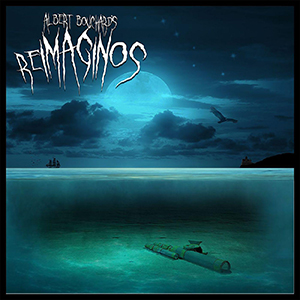 Right after that, I retired from the business, basically for 30 years. I became a teacher at a public school in Manhattan and I would play some gigs on the weekends or during summer vacation. I would go out and do a tour, but I was not a full-time musician. It was a hobby at that point. I made some records with the group I had at the time, Brain Surgeons, but it was not really serious. I was not into grinding it out like we did in the beginning or like I’m doing now [laughs]. I’m gonna be 75 this year…so I don’t know how reasonable it is you’ll be gigging into your 80s unless you’re doing something a little more mellow, which is kind of where I started out doing “Re Imaginos.” All the songs were very acoustically-based, even though I did have a little electric guitar. Now on “Imaginos II,” it’s a little bit more electric because I felt like this is the dark chapter. This is where the aliens win and humanity loses. The end is Armageddon [laughs].
Right after that, I retired from the business, basically for 30 years. I became a teacher at a public school in Manhattan and I would play some gigs on the weekends or during summer vacation. I would go out and do a tour, but I was not a full-time musician. It was a hobby at that point. I made some records with the group I had at the time, Brain Surgeons, but it was not really serious. I was not into grinding it out like we did in the beginning or like I’m doing now [laughs]. I’m gonna be 75 this year…so I don’t know how reasonable it is you’ll be gigging into your 80s unless you’re doing something a little more mellow, which is kind of where I started out doing “Re Imaginos.” All the songs were very acoustically-based, even though I did have a little electric guitar. Now on “Imaginos II,” it’s a little bit more electric because I felt like this is the dark chapter. This is where the aliens win and humanity loses. The end is Armageddon [laughs].
Before we get to that, what made you want to take another crack at “Re Imaginos?”
Bouchard: As we were recording it originally back in 1983, Sandy said, “I think that these songs would be better off just with an acoustic guitar. Why don’t you just get rid of the band and just record the songs yourself?” And I was like “no, I can’t go out and play gigs just with an acoustic guitar. I have to have a band…” But then over the years, people would say, “you should do your own version, and particularly this guy I’ve been playing with for 30 years, David Hirschberg. David was saying, “why don’t we just do bass and acoustic guitar as a duo?”
So we started and we also started playing “Imaginos” songs on my radio show. My oldest son Jacob [runs] WFKU.org. So David and I started playing some “Imaginos” songs, especially the one that really bothered me, which was the title track and “Girl That Love Made Blind,” which was also left off Blue Öyster Cult’s “Imaginos.” I needed to vindicate those tunes by playing them live in an acoustic way, the way that Sandy wanted originally, so we did that and the reaction from the fans was overwhelming. They were like, “you’ve gotta make a record.” They were sending messages every day actually, so that’s how it developed and they really liked it.
Where did the idea for this new sequel come from?
Bouchard: Well, that came from Sandy Pearlman. When we started, he said “this is gonna be a three record series.” It’s gonna be three, double gatefold LPs, because back then there were no CDs. There were only cassettes and vinyl records when we started, so that’s what I decided. The other thing is kinda personal, but in 2015, Sandy had an accident. He had some sort of stroke or aneurism and he fell down in a parking lot, hit his head, got a concussion and nobody found him for a few hours, so he wound up in a coma. He was completely out…but in February 2016, Sandy woke up. I went to San Francisco and I spent eight hours [with him] in the hospital one day and eight hours the next day. Even though he couldn’t speak, he definitely seemed to know what I was saying to him. When I told him I loved him, he cried. I cried and it was quite amazing. Traumatic but amazing because I think to myself, “if there was no Sandy, would I still have become a professional musician?” I think I would’ve, but would I have been successful? Doubtful. I might still be playing upstate on the weekends in the bars and teaching at the public school up there. It definitely changed my life for the better, as far as my career and my success. I owed him a lot, so I wanted to go and tell him how I felt about that…
 In the course of this time, I said, “you’ve gotta get better because we have songs we were starting to write but never finished…” He ended up passing away five months later and I visited his grave to talk to him. I don’t know if I believe in the afterlife or not. I’m kind of swayed towards the Buddhist philosophy where your spirit creates a vibration in the world, so that’s what lives on after your body and consciousness are gone. Your spirit lives in other people, so I was like “I gotta do this.” I told him I would do it, and even though he’s not here to help me do it, I’m going to do the best that I can to honor his wishes, so that’s basically what I’ve been devoting my life to for the past couple of years…
In the course of this time, I said, “you’ve gotta get better because we have songs we were starting to write but never finished…” He ended up passing away five months later and I visited his grave to talk to him. I don’t know if I believe in the afterlife or not. I’m kind of swayed towards the Buddhist philosophy where your spirit creates a vibration in the world, so that’s what lives on after your body and consciousness are gone. Your spirit lives in other people, so I was like “I gotta do this.” I told him I would do it, and even though he’s not here to help me do it, I’m going to do the best that I can to honor his wishes, so that’s basically what I’ve been devoting my life to for the past couple of years…
How would you describe the concept behind the current collection?
Bouchard: That’s the dark era. That’s when the aliens and the evil invade the design for humanity. It could be for our own good, who knows, but they are causing chaos, havoc, wars and unsociable behavior, also riots, racism and all this other stuff, which is actually happening now. All of that is predicted in the second installment of “Imaginos.” Man’s inhumanity to man, and according to Pearlman, it’s all the aliens’ fault.
What did it take to get much of the original group back together on the album?
Bouchard: Oh, that was nothing. All it took was for me to put out the other record and they’re like “oh, you didn’t ask us?” Well, that was really just [current keyboardist/rhythm guitarist] Richie Castellano. “How come you didn’t use any of the guys in the band?” I said, “they had their chance! Do you want to do something on the next one?” He said, “absolutely man!” I said, “could you get [original vocalist/guitarist] Eric [Bloom] and Donald to do it?” He said “sure.” It’s all Richie Castellano who made that happen, [along with Albert asking his brother Joe Bouchard, the band’s co-founding guitarist/bassist].
Do you foresee any additional reunions in the future?
Bouchard: You know, there’s been nothing mentioned, but I would say that I’m getting closer to those guys all the time. We have another record that we’re working on with [science fiction and fantasy author] Michael Moorcock, and that’s coming on quite nicely. That will probably include all of the members of the current Blue Öyster Cult, plus Joe and myself. That’s gonna be a huge undertaking and the next version of “Imaginos,” [currently slated for 2023], is also gonna have a lot of different people, all the guys in The Dictators, all the guys in Blue Öyster Cult, probably Mike Watt and some other people. It’s gonna be great. All my friends are gonna be jamming on this thing.
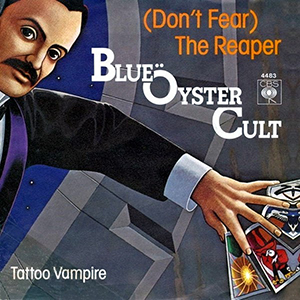 Flashing back further with the band, any thoughts on “(Don’t Fear) The Reaper” being one of Halloween’s all-time greatest hits?
Flashing back further with the band, any thoughts on “(Don’t Fear) The Reaper” being one of Halloween’s all-time greatest hits?
Bouchard: All I know is that the minute I heard the riff, and then subsequently about a week later, I heard the vocal on the first verse and said, “this is gonna be a classic. This is like nothing I’ve ever heard before in my life and I can’t believe that I’m gonna get to play on this!” I think I was a little bit conservative in my estimation of what it was gonna do. I knew it was gonna be a hit, absolutely, and I knew it was unique.
Why do you think “Burnin’ For You” has also endured to such an iconic degree?
Bouchard: That was a little harder to create than “(Don’t Fear) The Reaper,” which just happened. It was effortless. [“Burnin’ For You”] we had to work a little bit harder on to get it to sound right and I think that was very gratifying it did come out good. Because of the fact that Blue Öyster Cult was not like your Eagles or even your Aerosmith, as far as grinding out hits one after another, makes it special. Then there’s a lot of other things in our catalogue. “Cities On Flame With Rock And Roll” has been used in a bunch of TV shows and movies. “Godzilla,” of course, is a perennial favorite. There’s just a lot of good stuff in our catalogue, but [“Reaper” and “Burnin’”] are really our only two big hits. When you think about Blue Öyster Cult, that’s what you think about!
You also wrote and sang lead on several other significant songs, such as “Cites On Flame…” and “Hot Rails To Hell.” What was that like, especially coming from the somewhat rare positon of sharing vocal and drum duties?
Bouchard: Two words: Blues Project. We really, even to this day, still imitate The Blues Project, because that’s what they did…None of them were great singers, but they were all decent singers. If you play an instrument, people don’t have to hear your voice for every single song on the record. It’s a little bit better if you have other people that are decent and there’s enough difference between the vocal textures that everybody can sing. I think that was one of the things that got us signed to Columbia. We got signed to Elektra, and because we’re a bunch of idiots, we got kicked off the label, so then we had to go around and audition for all these people over and over. The second time was harder too because we auditioned three or four times before we got the Elektra deal and then we auditioned for more than 20 A&R [artist and repertoire] guys before we got to Clive Davis, who signed us.
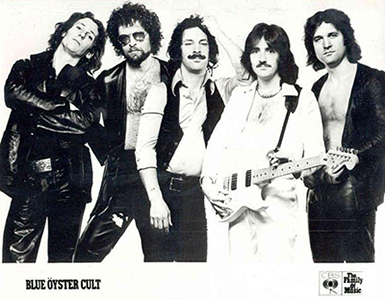 But Clive signed us on the strength of a demo that David Lucas produced, who ended up co-producing a bunch of Blue Öyster Cult records. David was a jingle writer and he said, “what I love about you guys is you all sing and you all have completely different sounding voices,” except for Joe and me, who sound the same, which is really a good advantage for harmony vocals. So if Eric or Donald were singing, Joe and I would back them up and it would sound seamless, like one person singing two parts. So that was really our model. The Beatles started it, but then The Blues Project carried it on with maybe, albeit, not so great vocals, but we saw that was the way we could make it happen for us with not so great vocals…I do sing in tune and in time. I think if you do that and you sing with heart, that’s the other thing [that makes it work].
But Clive signed us on the strength of a demo that David Lucas produced, who ended up co-producing a bunch of Blue Öyster Cult records. David was a jingle writer and he said, “what I love about you guys is you all sing and you all have completely different sounding voices,” except for Joe and me, who sound the same, which is really a good advantage for harmony vocals. So if Eric or Donald were singing, Joe and I would back them up and it would sound seamless, like one person singing two parts. So that was really our model. The Beatles started it, but then The Blues Project carried it on with maybe, albeit, not so great vocals, but we saw that was the way we could make it happen for us with not so great vocals…I do sing in tune and in time. I think if you do that and you sing with heart, that’s the other thing [that makes it work].
Across your entire career, can you recall any standout shows from around Chicago?
Bouchard: Yeah, the first time that we played in the Chicago area was somewhere around 1972 or probably ‘73. I have no idea what the club was, but it was in Cicero and the audience went crazy. We’d already done a whole tour of the South and kinda bombed, so we came up North and people really responded. We played in Cicero and that was an amazing gig. It was like, “oh man, we really got these people going,” so that was the beginning of us really feeling our power as a group and how we could really move an audience. Before that we were not sure, but [by then] our chemistry was really working…I miss playing in Chicago and I can’t wait to get back there!
For additional information on Albert Bouchard and Blue Oyster Cult, visit AlbertBouchard.net and BlueOysterCult.com.





